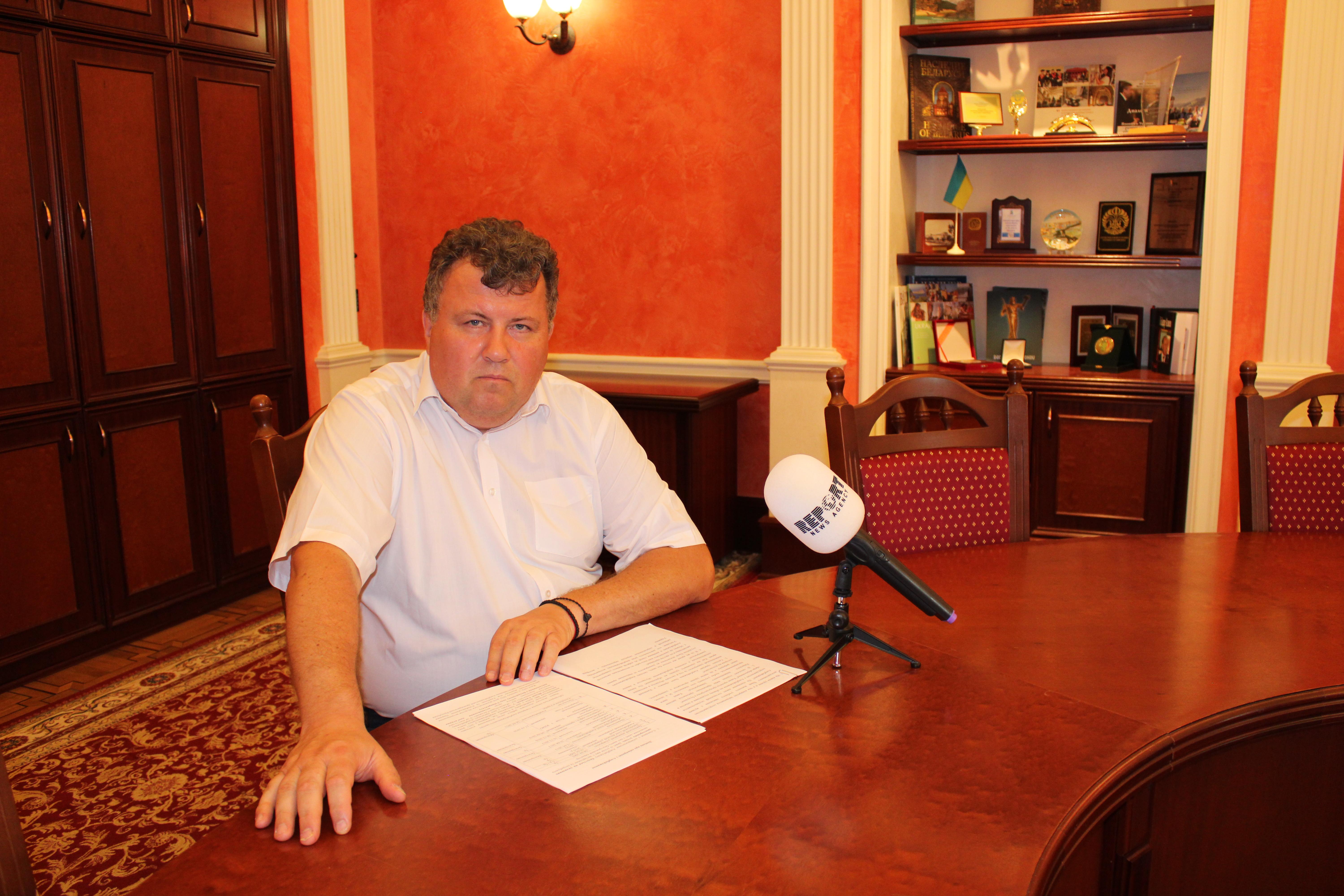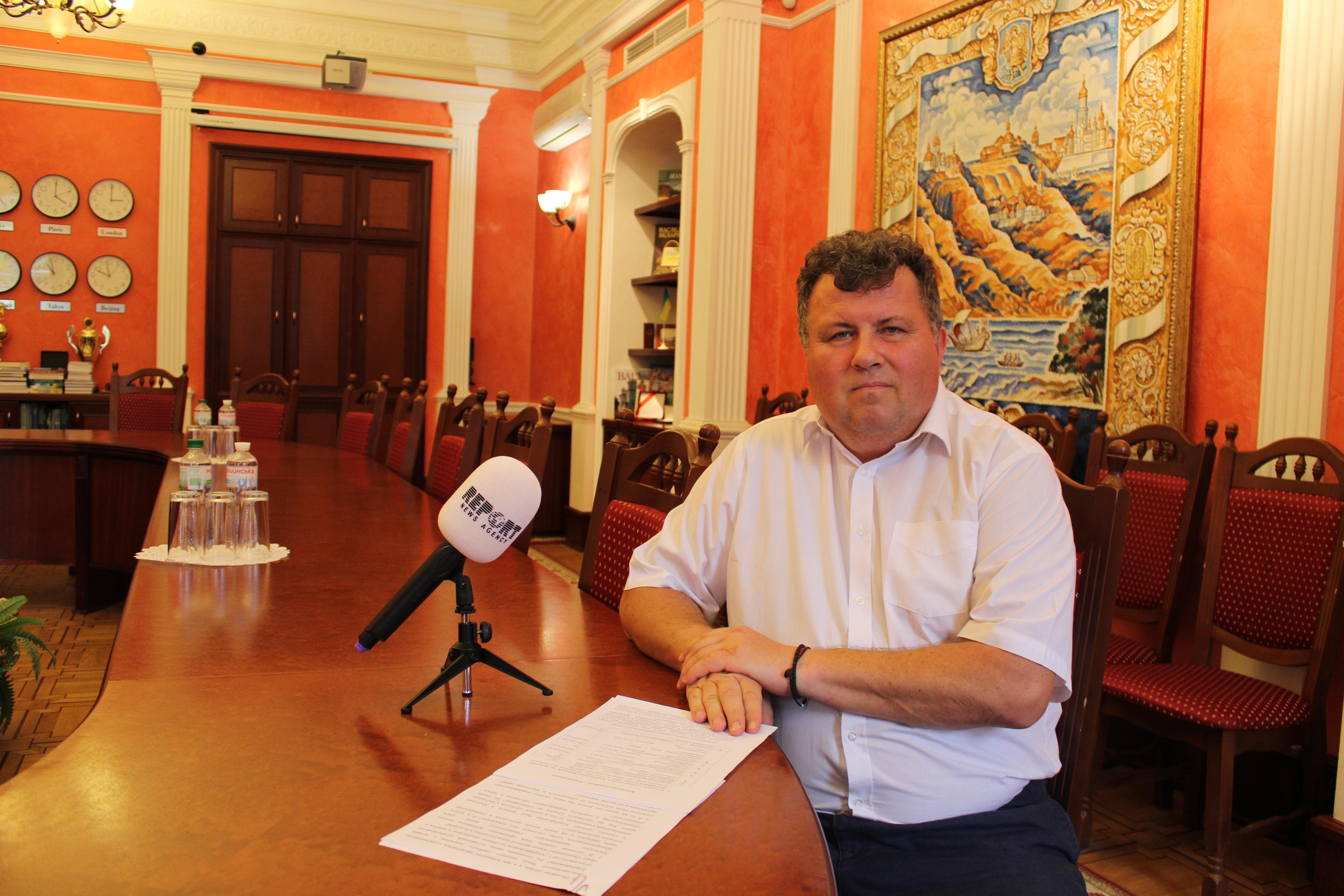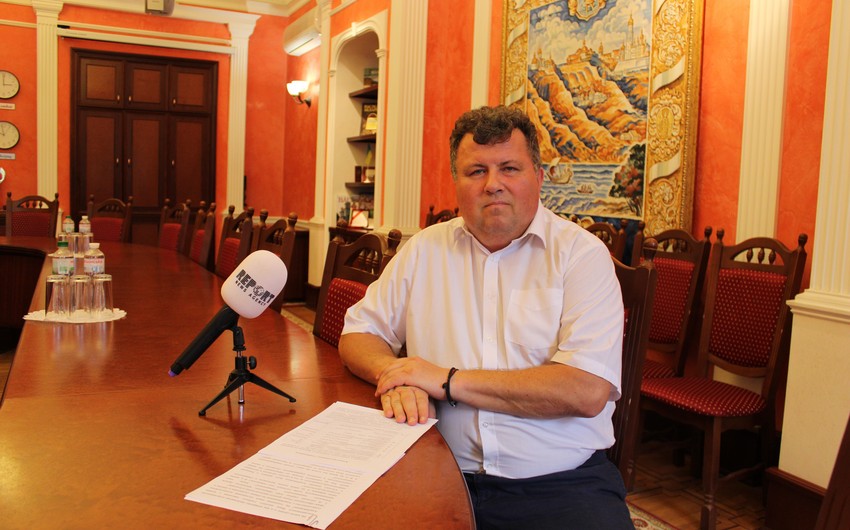Report's East European bureau interviews Volodymyr Bugrov, rector of the Kyiv national university after Shevchenko.
- What is the level and content of cooperation of your university with the universities of Azerbaijan? Based on which agreements are you cooperating with Azerbaijan in the exchange of students and experience in education? Which projects are envisaged for future?
- Today, the Taras Shevchenko National University of Kyiv has eight agreements with Azerbaijani universities. These are the Baku State University, the Baku Slavic University, the Azerbaijan State Economic University, the Azerbaijan University of Cooperation, Azerbaijan Technical University, Azerbaijan State University of Oil and Industry, Nakhchivan State University, as well as the Shamakhi astronomic observatory of the Academy of Science of Azerbaijan. And naturally today we have the agreement on cooperation with the embassy of the Republic of Azerbaijan in Kyiv, which helps coordinate our ties with the Azerbaijani universities and the authorities of the Republic of Azerbaijan. In general, certainly between Ukraine and Azerbaijan there is a set of various agreements. These are 131 agreements in various spheres and naturally in education. In 2000, the government of Ukraine and the government of Azerbaijan signed an agreement on mutual recognition of diplomas and scientific degrees, which makes our cooperation very fruitful, particularly, in the provision of educational services, teaching students from the Azerbaijan Republic in Ukraine and vise versa, the students from Ukraine in the Azerbaijan Republic. We consider that the legislative framework for the mutual cooperation between Ukraine and Azerbaijan is well-developed and it gives an opportunity for Ukrainian and Azerbaijani universities, students and teachers to cooperate without any red tape.
- How many countries officially recognize the diploma of the Kyiv national university? What steps are taken to improve this indicator? In general, which reforms and on which level are conducted at the university you lead?
- Ukraine is a member of the Lisbon convention - a document on the mutual recognition of diplomas in various countries. That is, all countries which sign the Lisbon convention, are assuming this responsibility when fulfilling definite conditions to recognize diplomas, issued in another country. Ukraine has fulfilled these commitments: this is the three-stage education system - Bachelor, Master, Doctor of Philosophy, this is the use of the European loan transfer system, this is the measurement of the time, spent in universities, this is the mutual recognition of qualifications. Therefore, speaking in general, the diploma of the Kyiv national university after Shevchenko is recognized already in nearly 150 countries, which have either signed the Lisbon convention or recognize its principles.

- How many of them are the countries of Europe?
- All European countries, without exception, from Great Britain to Turkey. Turkey is a European country, it is a participant of the Bologne process, just like Azerbaijan. All countries of the European community have signed the Lisbon convention and recognize the diplomas of Ukraine and the Kyiv national university after Shevchenko.
As for the quality of education, today we view the quality of education in terms of international ratings. Kyiv national university after Shevchenko is a participant of the QA and CR Higher education - these are British ratings, two of the three most popular in Europe. We are also the participant of the US News & World Report - a US weekly, which issues the rating every year. We are the participants of the Turkish and UAE ratings and we are the participants of the Shanghai rating. In particular, we were present in the Shanghai rating in maths. Therefore, the presence in these ratings means that the quality of education meets international standards. Naturally, we do not stop on what we have and what we had. Today the time and coronavirus pandemic showed the need to change. Therefore, we are now working on the model of a digital university, that is the university in which all its resources can be offered to a student in an electronic form. We are working on the model of new specialties, coordinated with the labor market. We are working on the model of the socially responsible university, because we need to cooperate and coordinate our actions with the entrants, their parents, employers, state and therefore we clearly see it as a mission of the university - quality education for quality life.
The whole development strategy of the university includes quality teachers, quality entrants, who become quality students, quality programs and quality education methods. It is based on the fact that our university is a research university, therefore, we provide for the scientific component in master's programs. Our university is innovative. We teach entrepreneurship, social responsibility, work ethics by profession to our students. This is what a modern young man or woman must have to find a good job with a decent salary. This is what our university development strategy is about.
- How many Azerbaijani citizens were admitted to Kyiv national university after Shevchenko in a year and how many of them are studying now? How do you assess their education level? What specialties do Azerbaijanis usually prefer in your university?
- Now these are 180 students from the Azerbaijan Republic.
- Are they the citizens of Azerbaijan?
- Yes, in fact, the number of Azerbaijanis is higher, but these are the citizens of Ukraine. There are 180 citizens of Azerbaijan, of them 178 study at the faculties and institutes and two are in the preparatory division. Why is the number so low? Because this year is not typical, there was a ban on entry without certificates, tests and many other things, therefore, their number has dropped. This year, around 40 students- citizens of Azerbaijan completed their education and there is still not a single student for admission.
What are their majors? The majority are studying at the Institute of law - the former faculty of law, institute of international relations and economic faculty. But there are students from Azerbaijan at other faculties and institutes. Most of them have very good school background. It is prestigious to enter the Kyiv national university after Shevchenko from the Azerbaijan Republic and applicants are aware of the high requirements. Several Milli Majlis deputies are the graduates of our university.
- How many Azerbaijani deputies graduated from your university?
- Now 4 or 5. Those who enter usually know about them. The entrants have good school education. True, sometimes they have to master the language. Because an everyday Ukrainian or previous Russia is one thing, but when you need to read books, textbooks on your major, it is a different thing. Therefore, at the preparatory division, we accentuate the improvement of the language by specialty. If you choose humanitarian specialties, you need to work on history, language and literature. If you choose physical sciences, you need to work on your maths, physics, chemistry, biology to understand what is being discussed at the lectures. But, in general, we are satisfied, and I think that students from Azerbaijan make up a very good, and successful contingent of students.
- Are there cases when Azerbaijani students are sent down from university for violating rules of discipline or for other reasons?
- There were no such cases last year. As a rule, we send down the students from the Azerbaijan Republic upon a letter from a migration service. The matter is that they come to study on a special visa, and if they engage in business, entrepreneurship or work, this is a different visa. The migration service is very strict. This is related to not only Azerbaijani students but also the students from other countries. And if there is such a violation, and you arrive on a student visa and start to work, the migration service sends the letter about the violation of the regime of stay, violation of the visa regime, and we are obliged to send the students down. But we did not send down any students from Azerbaijan for violating the discipline over the past few years, because there were no such violations.

- Is it possible to perpetuate the memory of any of the historical personalities of Azerbaijan in the name of one of the chairs of your university, given the fact that the activity of a number of Azerbaijani historical figures at definite times intersected the history of Ukraine?
- We have no such tradition, but 2021 marks the 880th anniversary of the birthday of Nizami Ganjavi and President of Azerbaijan Ilham Aliyev - our honorary doctor - declared this year the Year of Ganjavi. In cooperation with the Azerbaijani diaspora in Ukraine, in cooperation with the Azerbaijani embassy to Ukraine, we have prepared a project on the erection of the monument to writer Nizami Ganjavi in the botanical garden. This is the center of the city and we consider this memorial a decoration and a symbol of the Ukrainian-Azerbaijani friendship.
Further, on December 2022, we will mark the 30th anniversary of the restoration of diplomatic relations between Ukraine and Azerbaijan. Why restoration? Because, in fact, the Azerbaijan Democratic Republic and Ukrainian People's Republic had diplomatic relations and the ambassador of the Azerbaijan Democratic Republic in the Ukrainian state was Yusif Vezir Chemenzeminli, who was the student of the faculty of law at the Imperial University of St. Vladimir. He is a really genius person and now we, together with the embassy of the Republic of Azerbaijan, are preparing a lecture hall bearing his name. We have such a tradition to name the lecture halls after outstanding personalities. Together with the embassy, we are preparing materials to feature his life, his research works and diplomatic career. We have agreed that by the 30th anniversary of the diplomatic relations, together with the embassy, we will launch this lecture hall at the Red corps of the university.
Discussions are underway to open the center of the Azerbaijani language at the Institute of Philology. We now have around 35 different language and cultural centers: French, Bulgarian, Swedish, Chinese institute. And we, with the ambassador of Azerbaijan to Ukraine, said that, maybe, considering the number of students from Azerbaijan and Azerbaijani students in Ukraine, we could negotiate the opening of the Azerbaijani center. Especially that once in several years we declare admission for the Azerbaijani language at the chair of Turkic sciences, as the second language in studying the Turkish language.
Today, the embassy of Azerbaijan in Ukraine is very active like in previous years, and we meet, discuss, promote various projects of monuments, lecture halls, Azerbaijani center and so on. I think this is the evidence of our close ties. I think that this joint activity will benefit the citizens of both countries and our university, in particular.
- There were facts when our students who receive education at your university cannot speak Russian, Ukrainian or English though they received the diploma. How did they study then?
- It is difficult to say because we even invite embassy representatives to the state exams. It is very good that you paid attention to that. There was such a claim from the embassy in the past, but currently there are no such cases. There was a claim from the previous ambassador, he graduated from our university, the faculty of international relations. We started to control exams so that there was no such liberalism. I also had a student from Azerbaijan at the faculty of philosophy. He told me that it is hard for him to understand, because he is from a different country, and has a different language. I told him, 'I do not want you to become a super-philosopher, but there is a minimum that you have to now.' When I was a student in the Soviet times, I had many groupmates from Azerbaijan and there were no problems. None of them ever said, 'I am from a different country.' We treat it carefully and invite the embassy represenatives to all state exams. We have many students from Iran, we invite the representatives of the Iranian embassy to the exams. We have many students from India, somewhere around 500 people now. We also invited the attache on cultural issues from the embassy of Azerbaijan, who is also engaged in educational issues, she is also the graduate of our university, of the Institute of International Relations, she also attended these exams. So, if earlier there were some doubts, we are now trying to disperse all of them.


 https://static.report.az/photo/6c205558-8cbb-341a-9820-8f08f287c3fb.jpg
https://static.report.az/photo/6c205558-8cbb-341a-9820-8f08f287c3fb.jpg

